Ever wondered if your Manx cat’s diet should be as unique as their tailless charm? This guide will unlock the secrets to providing your Manx with the best food for their specific needs. From understanding the nutritional needs of Manx cats to discovering the healthiest meals, we’ve got everything covered to ensure your feline friend stays happy and healthy.
Key Takeaways
- Manx cats need a diet rich in high-quality proteins.
- Incorporate essential vitamins and minerals into their meals.
- Fatty acids and omega-3s are crucial for their health.
- Both commercial and homemade food options are viable.
- Adjust the diet according to their specific needs and health conditions.
The Nutritional Needs of Manx Cats
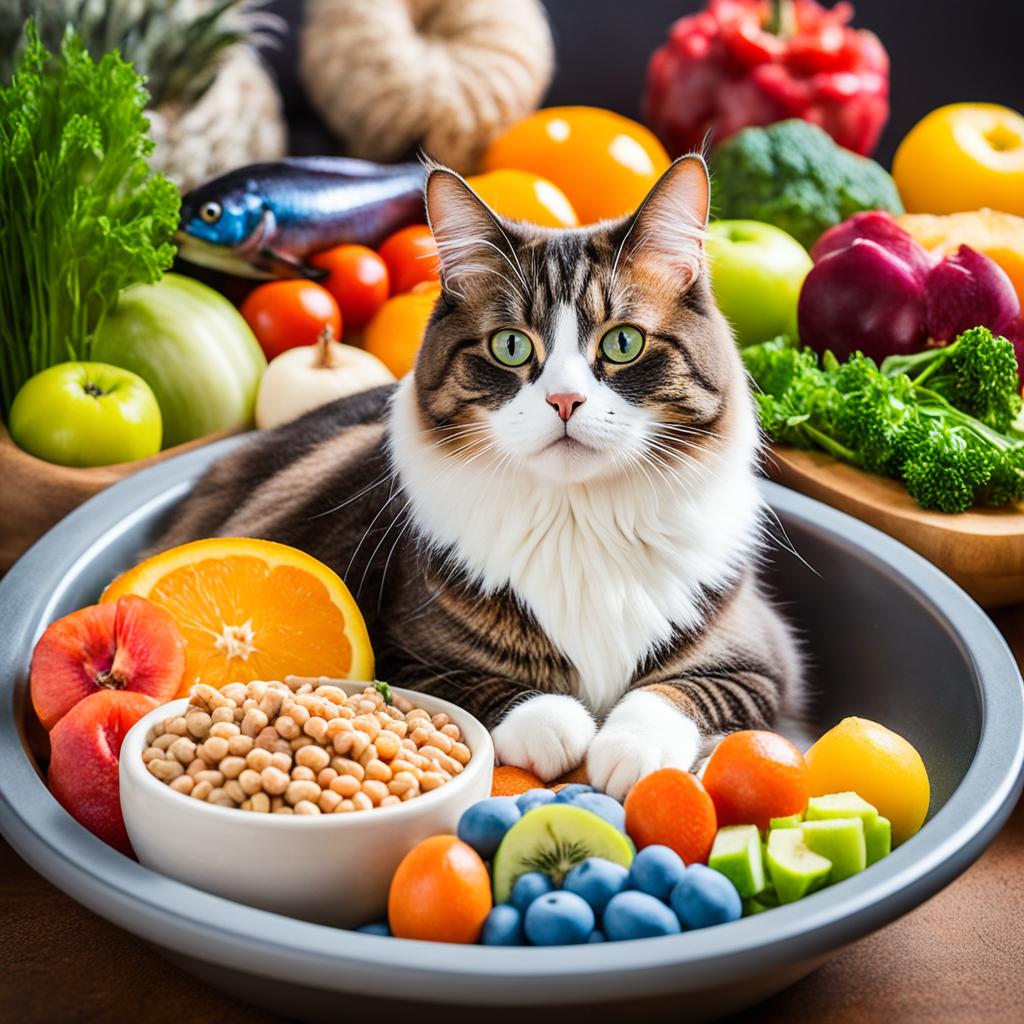
Manx cats bring joy to their owners with their playful antics and distinctive appearance. To keep them healthy and robust, it is essential to understand their unique nutritional needs. The right diet can significantly impact their overall well-being, contributing to their longevity and quality of life.
Protein Requirements
High-quality proteins are a cornerstone of Manx cat nutrition. These proteins support muscle growth and maintenance, ensuring your Manx cat remains active and lively. Look for cat food nutrients that list real meat, such as chicken, fish, or turkey, as the primary ingredient. Avoid products with excessive fillers, as they provide little nutritional value.
Essential Vitamins and Minerals
Vitamins and minerals play crucial roles in Manx cat health. Vitamins like A, D, E, and B-complex are vital for various bodily functions, including vision, bone growth, and energy production. Minerals such as calcium, phosphorus, and magnesium support strong bones and teeth. Ensure your cat’s diet includes these essential nutrients to keep them thriving.
Fatty Acids and Omega-3
Fatty acids, particularly Omega-3, are indispensable for a Manx cat’s cognitive function and inflammation reduction. These nutrients contribute to a shiny coat, healthy skin, and overall vitality. Introduce foods rich in Omega-3, like fish oil or flaxseed, into your cat’s diet to bolster their Manx cat health.
Best Food for Manx Cats

Ensuring your Manx cat gets the best food is crucial for their overall health and wellbeing. Whether you opt for premium cat food or decide to embark on the journey of homemade cat diets, you must provide a balanced diet to meet their unique dietary needs.
High-Quality Commercial Cat Food
Commercial cat foods are a convenient and reliable option for feeding Manx cats. These premium cat food options often come fortified with all the essential nutrients, vitamins, and minerals necessary for a balanced diet. Brands like Hill’s Science Diet, Royal Canin, and Blue Buffalo have specialized formulas that cater to the nutritional needs of Manx cats, ensuring they receive high-quality proteins and fatty acids vital for optimal health.
| Brand | Features | Benefits |
|---|---|---|
| Hill’s Science Diet | Fortified with essential nutrients | Supports overall health and immune system |
| Royal Canin | Specific formulas for different breeds | Targets unique dietary requirements |
| Blue Buffalo | Natural ingredients with vitamins | Promotes healthy coat and skin |
Homemade Diet Options
For those who prefer more control over what their feline friend eats, homemade cat diets can be a rewarding option. Homemade diets allow you to tailor your Manx cat’s meals according to their specific preferences and health requirements. However, it is crucial to follow veterinarian guidance to avoid nutrient deficiencies that could arise from an imbalanced diet. Ensure the meals you prepare include high-quality proteins, carbohydrates, and essential fats to support their health.
When feeding Manx cats with homemade diets, consider using ingredients such as cooked chicken, fish, and vegetables. These provide essential nutrients and cater to their carnivorous nature. Always consult your vet to create a nutritionally comprehensive plan, and avoid foods like onions or garlic which are toxic to cats.
What to Feed a Manx Cat?
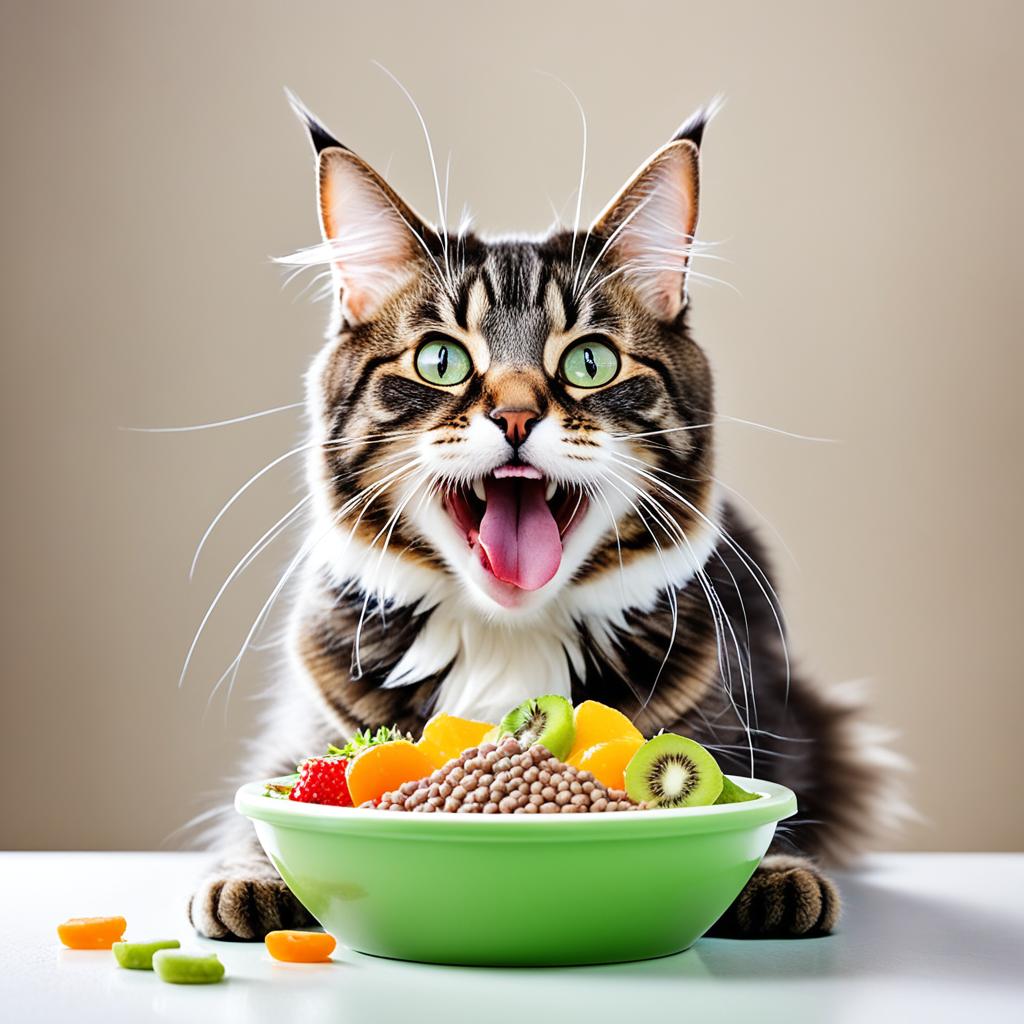
Choosing the right nutrition for your Manx cat can feel daunting, but understanding the benefits of different food types helps make the best decisions for your tailless friend. Let’s delve into the various options and their respective advantages.
The Role of Wet Food
One significant advantage of wet food is its natural hydration, which is crucial for Manx cats due to their potential for urinary issues. Wet cat food benefits also include its palatability, which can entice even the pickiest of eaters. Moreover, the texture variety can add excitement to your Manx cat’s diet.
Benefits of Dry Food
Dry cat food is another popular option. Not only is dry food convenient and easy to store, but it can also aid in maintaining dental health by helping to reduce plaque buildup. Remember to balance this with ample fresh water to ensure your Manx stays properly hydrated.
Combination Feeding
A mixed feeding strategy can offer the best of both worlds: the hydration and flavor of wet food paired with the dental benefits and convenience of dry food. This approach can maintain your Manx cat’s interest in mealtime, while also offering a more balanced exposure to different textures and nutrients.
| Food Type | Main Advantages | Considerations |
|---|---|---|
| Wet Food | Hydration, Palatability | Shorter shelf life, cost |
| Dry Food | Convenience, Dental Health | Less hydration |
| Combination | Texture variety, Balanced nutrients | Proper ratio management |
By understanding and utilizing a mixed feeding strategy, you can ensure your Manx cat receives a well-rounded diet that caters to their health needs and keeps them happily engaged at mealtimes.
Feeding Tips for Manx Cats
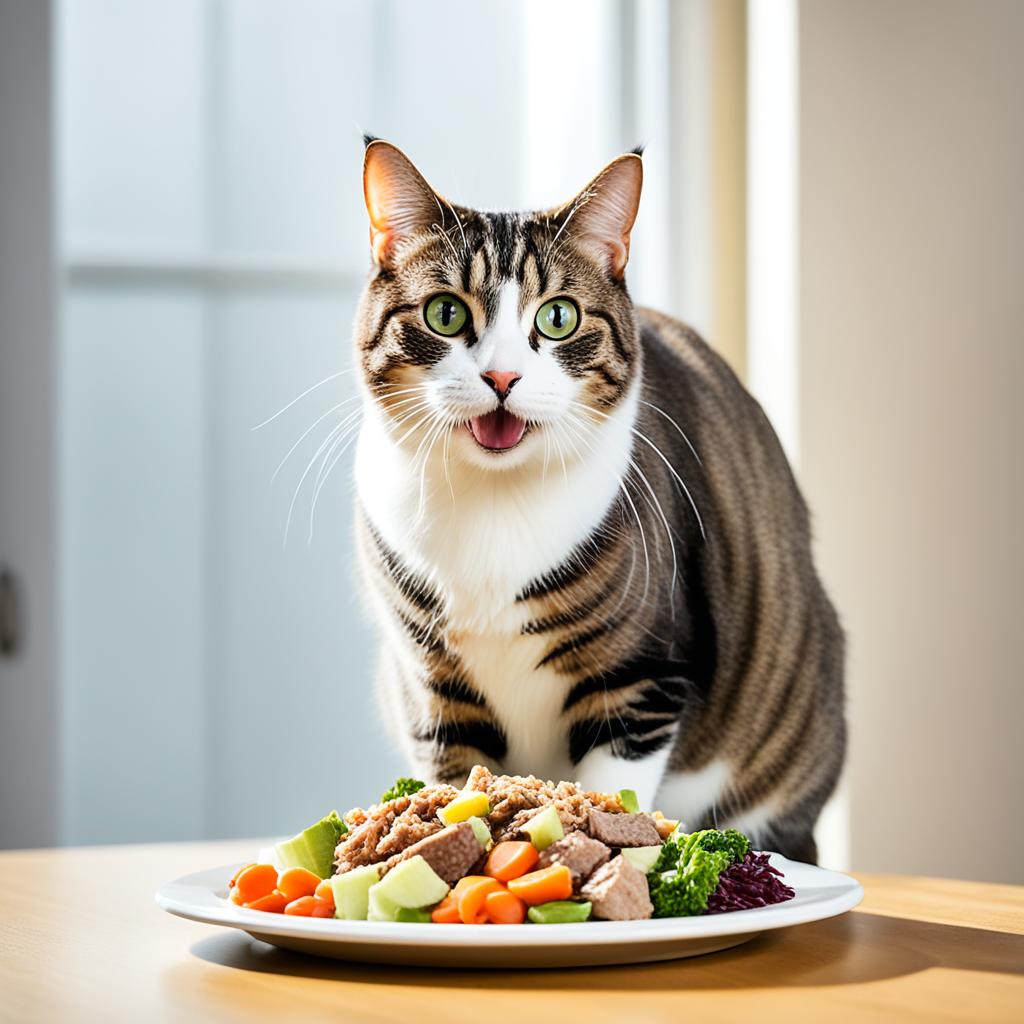
Ensuring your Manx cat gets the best nutrition can make all the difference in their health and happiness. Here are crucial feeding tips that align with proper feeding guidelines for Manx cats, helping you manage their diet efficiently and effectively.
Portion Control
Portion control is essential when it comes to feeding Manx cats. It’s all about balance—feeding them enough for sustenance without overdoing it. Use a kitchen scale to measure their food accurately. Over time, this simple practice can prevent overfeeding and help in controlling cat weight.
Feeding Schedules
A consistent feeding schedule is a cornerstone of a healthy feeding regimen. Establish regular meal times and stick to them. This not only contributes to better digestion but also helps stabilize their metabolism. Your Manx will appreciate the routine, and you’ll appreciate a happier, healthier cat.
Monitoring Weight
Regularly monitoring your Manx cat’s weight is crucial. Keep a close eye on any fluctuations to ensure they maintain a healthy weight. Investing in a pet scale can help track their weight accurately. This practice is vital for catching any potential health issues early and allowing you to adjust their diet as needed.
| Feeding Tips | Benefits |
|---|---|
| Portion Control | Prevents overfeeding and helps in controlling cat weight |
| Feeding Schedules | Ensures consistency in digestion and metabolic health |
| Monitoring Weight | Early detection of health issues and diet adjustments |
Common Dietary Issues in Manx Cats
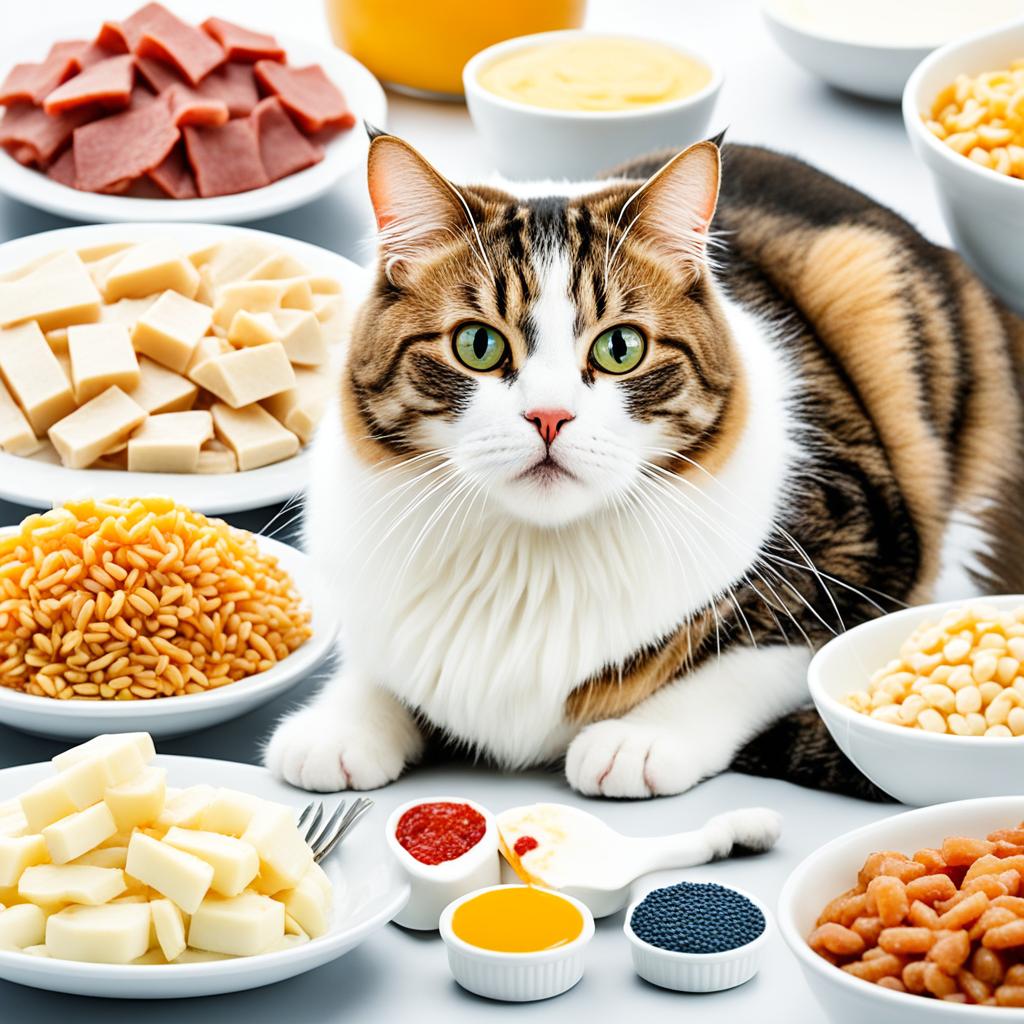
Understanding the common dietary issues in Manx cats is crucial for maintaining their health and longevity. These felines are prone to certain conditions that manifest through gastrointestinal issues and food intolerance. You might observe symptoms such as vomiting, diarrhea, or skin irritation, all of which can stem from Manx cat digestive problems. Identifying the root cause of these ailments can sometimes be a challenge.
One common culprit is food allergies in cats. These allergies often trigger adverse reactions and, in some cases, might require a specialized diet. A brief consultation with your vet can help determine if food allergies in cats are to blame. In scenarios where allergies are identified, your vet might recommend a hypoallergenic diet or specific prescription foods designed to minimize reactions.
In addition to allergies, Manx cat digestive problems can also stem from a variety of other sources, such as intolerances to specific food ingredients or even stress-related digestive disturbances. Being vigilant and responsive to these symptoms is essential in managing your Manx cat’s health.
| Issue | Potential Cause | Recommended Solution |
|---|---|---|
| Vomiting | Food Allergies | Hypoallergenic diet |
| Diarrhea | Ingredient Sensitivity | Elimination diet |
| Skin Irritation | Allergies | Veterinary-prescribed food |
Manx cats can also face an array of Manx health concerns directly linked to their diet, such as chronic inflammation or gastrointestinal disorders. It is vital to consult your vet regularly for advice on how to address these potential health issues proactively. Manx health concerns should never be ignored, as early intervention often leads to better outcomes.
Healthy Meals for Manx Cats
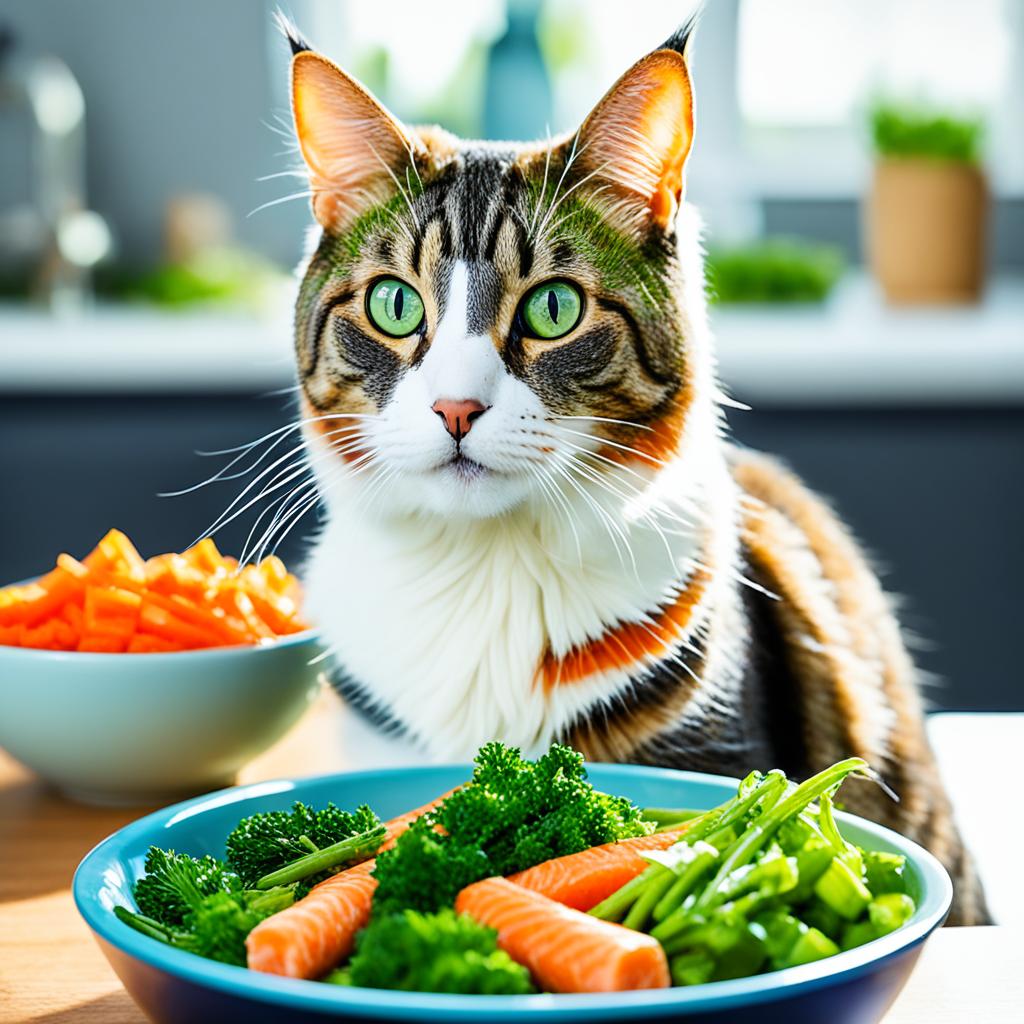
Crafting healthy meals for your Manx cat involves more than just opening a tin. A balanced cat diet requires a mix of proteins, carbohydrates, fats, vitamins, and minerals to keep your feline friend purring with delight. You want your Manx to strut around with energy, a shiny coat, and, most importantly, a happy tummy.
Balanced Meals
Let’s talk about balanced meals. This isn’t just about filling up the bowl—it’s about ensuring your Manx gets a perfect mix of nutrients. Picture this: lean meats such as chicken or turkey, blended with small amounts of rice or sweet potatoes, and a sprinkle of essential vitamins and minerals. Why stop there? Add a dash of fish oil for those omega-3 fatty acids. Now that’s a gourmet meal!
Treats and Snacks
Everyone loves a good treat, and your Manx is no exception. While it’s important to cater to their cravings, remember to keep it in moderation. Avoid turning your Manx into a feline couch potato by balancing those delicious cat treats with their overall dietary needs. Opt for snacks that complement their main meals, ensuring they form part of a well-rounded Manx meal planning strategy. Stick to natural treats like freeze-dried chicken or tiny pieces of cooked fish to spoil them just right.
“A treat a day keeps the boredom away, but too many can lead your cat astray!”
| Nutrient | Ideal Source | Benefits |
|---|---|---|
| Protein | Chicken, Turkey, Fish | Muscle Development |
| Carbohydrates | Rice, Sweet Potatoes | Energy Supply |
| Fats | Fish Oil, Chicken Fat | Healthy Skin and Coat |
| Vitamins | Various Vegetables | Overall Health |
| Minerals | Bone Meal, Organ Meats | Bone Strength |
So, when planning your Manx cat’s meals, think balance, variety, and a bit of flair. They’re more than just pets; they’re family, and they deserve nothing less than the best!
Manx Cat Food Types

When considering options for feeding your Manx cat, it’s important to understand the variety of diets available. Let’s dive into a couple of specific types that might catch your interest.
Raw Food Diet
Raw diets for cats often aim to replicate what felines might eat in the wild. This type of diet can offer benefits like improved coat condition and energy levels. However, feeding raw food also comes with potential risks such as bacterial contamination and the need for precise nutrient balancing.
Grain-Free Options
Grain-free cat food can be a suitable option for your Manx cat, especially if they have allergies or sensitivities to grains. These diets often use alternative sources of carbohydrates like potatoes or peas. Despite their popularity, not all cats need to avoid grains, so always consult your veterinarian before making this dietary switch.
Recommended Diet for Manx Cats

Providing the right diet for your Manx cat is essential to ensure that they maintain optimal health. Following a veterinary diet for Manx cats not only helps in meeting their unique nutritional needs but also supports their overall well-being.
Veterinarian Recommendations
When it comes to establishing a proper diet, always consider the advice from your vet. A specialized veterinary diet for Manx cats should take into account their age, health status, and any specific nutritional needs they may have. A tailored diet ensures that your cat gets all the necessary nutrients.
Adhering to Dietary Guidelines
Sticking to dietary guidelines is crucial. Manx cats require a balanced mix of proteins, fats, carbohydrates, vitamins, and minerals. Make sure to follow feeding recommendations, including portion sizes and meal frequency, to avoid overfeeding and associated health risks.
- Consult your vet for personalized dietary plans.
- Ensure meals are balanced and nutrient-dense.
- Adhere strictly to portion size recommendations.
With the right approach and diligent adherence to Manx cat feeding recommendations, you can help your furry friend thrive and lead a healthy, happy life.
Special Considerations for Senior Manx Cats
Caring for your aging Manx cat means paying special attention to their changing dietary needs. As they grow older, their metabolism slows and their bodies may require different nutrients to maintain optimal health.
Adjusting Diet with Age
One of the key aspects of senior Manx cat care is making the necessary diet adjustments for aging cats. Older Manx cats may benefit from a reduction in calories to prevent unnecessary weight gain. High-quality protein remains essential, but it should be easier to digest. Consider foods rich in antioxidants to support their aging immune system.
Supplements and Additives
Adding the right cat supplements can make a big difference in maintaining your senior Manx cat’s health. Glucosamine and chondroitin supplements can aid in joint health, while digestive enzymes and probiotics can support gastrointestinal function. Omega-3 fatty acids can help alleviate inflammation and enhance coat condition. Always consult with your veterinarian before introducing new supplements to ensure they are suitable for your feline friend.
- Reduce calorie intake to prevent weight gain.
- Incorporate high-quality, easily digestible proteins.
- Add antioxidants for immune support.
- Consider glucosamine and chondroitin for joint health.
- Use digestive enzymes and probiotics for better GI function.
- Supplement with omega-3 fatty acids for inflammation and coat health.
Transitioning to a New Diet

Changing your Manx cat’s diet requires finesse, patience, and a well-thought-out plan. You can’t just swap out their bowl and call it a day. Instead, focus on *introducing new cat food* gradually. Start by mixing a small amount of the new food with their current meal.
As days go by, incrementally increase the portion of the new food while decreasing the old one. This method not only makes the *dietary transition* smoother but also minimizes upset tummies and protest meows.
- Day 1-3: 25% new food, 75% old food
- Day 4-6: 50% new food, 50% old food
- Day 7-9: 75% new food, 25% old food
- Day 10+: 100% new food
This slow, methodical approach ensures your Manx adjusts without any fuss, paving the way for a smooth transition to a new diet that meets their nutritional needs perfectly.
If your Manx shows signs of digestive upset, slow down the process. No rush!
In your adventure of *changing a Manx cat’s diet*, always keep an eye on their reaction to the *new cat food*. Happy munching to your tailless friend!
Conclusion
Understanding what to feed your Manx cat is the cornerstone of their health and happiness. It’s not just about choosing any cat food from the pet store shelves but selecting a well-rounded diet that caters specifically to the nutritional needs of these charming, tailless companions. By paying attention to high-quality proteins, essential vitamins and minerals, fatty acids, and omega-3, you are well on your way to maintaining your Manx cat’s health.
Establishing proper feeding routines can seem like a small task, but it makes a world of difference. Whether it’s portion control, sticking to a regular feeding schedule, or ensuring a balanced mix of wet and dry foods, these practices can help keep your Manx cat in peak condition. Just like us, they benefit from consistency and good habits.
As your Manx cat ages, adjustments to their diet are inevitable. Paying attention to their evolving needs, introducing the right supplements, and making necessary changes will ensure that your furry friend remains active and happy throughout their golden years. By following this comprehensive Manx cat dietary guide and staying vigilant, you can enjoy a healthy, joyful life with your tailless pal by your side.




